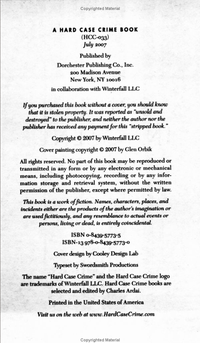
There has been quite a lot reaction to the post, and "back blog" discussion, on Sarah Weinman’s blog regarding the MWA’s determination that Charles Ardai’s SONG OF INNOCENCE is ineligible for Edgar consideration because it is a self-published book.
The most unusual development in this discussion is that now Charles Ardai is going to great lengths to portray himself as just a book packager — someone who brings manuscripts to a publishing house in exchange for a commission or fee — rather than as an editor and publisher.
This turn-of-events is especially surprising given that he has never characterized himself as a packager before, at least not in the dozens of articles and interviews I have browsed through today on the web, nor on the Hard Case Crime site, nor in the books that he publishes (where he actually states on the copyright page that "Hard Case Crime books are selected and edited by Charles Ardai," an unusual statement for a simple "book packager" to make). Nor have I found any instance of him correcting anyone else who has referred to him as a publisher, editor and founder of Hard Case Crime. In fact, he has done just the opposite, taking justifiable pride as editor and publisher of one of the best mystery imprints in existence today. As he says on Sarah’s blog:
It would be foolish, of course, for me to argue that I am not, in the
public’s eye, the "publisher" of Hard Case Crime (and the editor of the
line and the face and voice of the line — I’m proud to play these
roles).
The irony is that even if one were to accept his new characterization of himself as a book packager and not, as he has claimed before, a publisher and editor — and if you were to accept his arguments regarding his relationship with Dorchester — his book would still not be eligible for Edgar consideration under our rules that define "self publication." So why is he bothering to make the distinction?
Charles Ardai argues that even if his book is a self-published title, its exclusion from the Edgars shows the injustice of the MWA in not allowing self-published books for award consideration. I disagree, for many of the same reasons that author Jason Pinter expressed on his blog today:
Having been on the other side of the publishing desk, I equate MWA’s
banning of self-published books to the rule most larger houses have of
not accepting unagented submissins. The rule is not there, of course,
out of snobbery, but to act as quality control for editors and
publishers whose time is already taxed to begin with.[…]Getting self-published today is easier than ever. It does not take any
editorial or authorial skill to be self-published, only a pile of paper
and enough money to cover the costs. And for many, the cost is worth
seeing your manuscript bound between two covers. I can be relatively
certain that if all self-published books were permitted, the time
consumed would go from "minor inconvenience" to "near insurmountable"
almost overnight. Not to mention, in my opinion, it would encourage
even more self-publishing,
as aspiring authors would soon realize that for $199 they could be
judged on the same field as Lawrence Block. And if this leads to
authors paying a few books to get their books bound for award
consideration instead of honing their craft, I think it’d be a real
shame and could actually do the opposite of what’s intended.[…]Since anyone can self-publish a book with ease, what is the real
difference between a self-published book and a stack of loose
manuscript pages? Or somebody with a Word file saved on their hard
dive? There must be some sort of quality control.
I would never equate Ardai’s book with "a stack of loose manuscript pages." He is an accomplished, acclaimed and respected author. But the fact remains that he self-published his novel. He was simply in a position to do a better, and much more professional job of it, than someone like Jim Hansen or John Q. Public with a credit card who only has access to services like Lulu. Ardai, on the other hand, has the advantage of already heading his own publishing company…or, if you accept his new argument, to have an existing book packaging arrangement with Dorchester under which he could include his own book.
The solution to this "problem" (not that I agree there is one) is for Ardai to submit his next book to a publisher he neither owns nor has a business relationship with as a "book packager."








